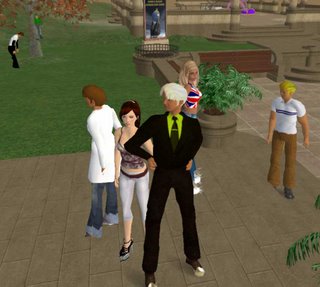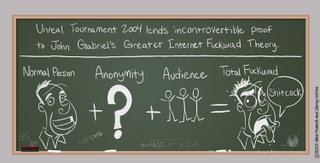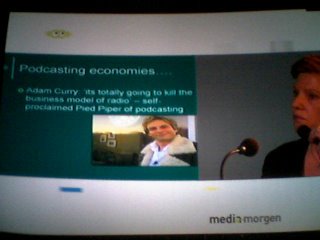I was really proud when my daughter sent her first e-mail about two years ago. With at hotmail account an a little help from dad (typing was a somewhat difficult) the electronic mail buzzed off to mom, and that’s where it ended. She hardly sent any mail since then. Not because she’s not on the computer anymore, on the contrary, madam (9 years old) spends more time online then in front of the TV.
But no more e-mail. The coming generation, for whom being online is standard, uses instant messaging (mostly MSN messenger) to communicate online. I don’t always get what they’re chatting about though, it’s communicating for the fun of it (I guess that’s the definition of chatting). When it has to be a bit more structured, the conversation moves to a blog or myspace (myspace.com: 37 million unique visitors in February 2006!). Some teenagers (especially in the US) live on myspace. Posts on their blogs succeed one another at a speed that outpaces many mailboxes.
And what about e-mail as a source of information? Is there anything more practical then a newsletter that keeps you informed of the changes on your favourite websites, without having to visit it? Yes there is, and it’s called RSS (Real Simple Syndication). Through an RSS feed your computer can receive the latest changes automatically, it’s a kind of (free) subscription. You organize your feeds just as you want, by subject, per type of site or simply chronologically, thus building your personal stream of information.
In fact, every type of e-mail today has a better alternative. And those alternatives have two things in common. One: they take ‘permission marketing’ one step further. This time the consumer decides him/herself to go and read a blog or refresh an RSS feed. Two: the interaction (response) is even easier and faster then clicking a button in an e-mail. It’s faster to type an answer in a messenger window, push enter and the message has already arrived. Faster, more interactive and totally under control, that’s the way the modern consumer want it.
This is my evolution theory:
Invitation > E-card > iCal
Courier > E-mail attachement > Online hard disc
Fax > E-mail > Instant Messenging
Letter > E-mail > Blog
Newspaper > Newsletter > RSS
And …, before all you marketer run of to your creative agency or media planner to get a communications plan build with these new media, remember this: consumers choose these channels because they have them under control and because interaction is easier. So be ready for that.
Arrived in Cannes yesterday afternoon. To us (living in Belgium) it's less then 2 hours flying, but we were in the plane with a guy from China who travelled a day. To him, this festival is really the event of the decade, whereas my collegue next to me (Michael) is here for the 15th time or so.
Yesterday I managed to catch at least part of David Eastman's speech (CEO of Agency.com) on integrated campaign. But REALLY integrated then, more then just re-working the same idea in different media (matching luggage as they call it in the UK apparently). Use each medium for what it is good at, and exploit it to the max.
Even though I have the privilige to work in one of the most integrated agency group (TBWA+Tequila+Agency.com in Brussels), we can still do better. In fact, we can always do better can't we?
Over the last months there have been a lot of discussions about the viability of Wikipedia. The consumer-build online encyclopedia is struggling with people who abuse the system by entering bad quality information or even intentionally wrong data (or self-promotion). On a whole, research says, Wikipedia is as reliable as the famous Encyclopedia Brittanica. But there are holes in the system, the editorial teem can't keep up with the 'bad guys'.
This cartoon shows why (The Internet Fuckwad Theory):
I don't know about the rest of the world, but over here we are spoiled with some would-be trendwatchers who mistake eventspotting for trendwatching. Yesterday I read a column which basically took one isolated phenomenon which occured at the other side of the globe (in a totally different culture), scratched together a number of events (not based ony research) and mixed the two together into an opinion.
Now I'm not an expert on the subject under discussion (spoiled kids), but my wife happens to be a "expert by experience" having been a teacher for years and now running a show where parents with kids come in on a daily basis. And she confirms my feeling. What may (may!) be a symptom of a trend over in the US (one city that is), is not even actual over here. Far from it being a 'trend'.
I value trendwatching very much and we'll need more of it to keep our businesses running in this fast changing world. But it's also a métier that has a difficult time getting credibility. So in the name of trendwatching, let's keep the quality up to standards please!
A good example of how it should be done? Go to www.trendwatching.com
As you can judge from the frequency of my posts, life is somewhat hectic around here. The evaluation of the Media Morgen conference is still due, but I did not want to withhold you this quote from Joseph Jaffe's latest podcast (with the guys from American Copywriter):
Old scool:
"No one ever got fired for putting TV on the plan"
Today:
"No one ever got fired for putting search on the plan"
I just love this one, probably gonna use it in my mail footer (or is that old scool too? :-) )
Helen Shaw had a good view on the future of radio during today's "Media Morgen" conference. I'll post some more notes later this week (too busy now), but wanted to share this with you already now.
In fact, at a certain point she talked about the evolution of radio starting with the first big & clunky radio's and ending with ... Podcasting (as a symbol of where we are going to). And actually, everybody today mentionned podcasting as if it's been there since for decades. Let's hope we can get Podcasting really going in Belgium now.
Check the slide where she mentionned Adam Curry (with picture!):
(Bad quality picture, I know. But I'm waiting for the new Sony Ericsson P990 to appear in stores)
VRT, the Belgian national TV station is launching a theme-week on new media. As of May 29th the focus will be on "Media Tomorrow" for a week, ending with a special show on sunday.
Ramping up to the week a number of opinion leaders give their view on the future of TV on a special website: www.mediamorgen.be.
Nu ook in het Nederlands op digimedia.be: Wie betaalt voor jouw aandacht, Windows Live of Gmail?
Microsoft has decided to release new developments in Google style. All kinds of applications in beta version are disclosed bit by bit. Anybody who regularly browses through www.live.com or labs.google.com can puzzle together the future. In the near future we will not choose for Windows, Linux of OSX, the internet is the platform of the future and then we will choose between Google or Live.com.
Away with Windows, OSX or any other operating system, the future is online. In a year or so, most of your computer activities will be conducted from a browser through a broadband connection. Reading your mail or instant messaging can already be done with only a browser in Gmail/GoogleTalk or Windows Live mail and messenger. The startup business is running at full speed again, developing all kinds of ideas to help entrepreneurs big and small to do business seamlessly with only a computer and a broadband connection. And seamless usually also means free, ‘no friction’ is the motto.
Windows is over with as a cash cow for Microsoft, you can just as well install Linux (for free). Kick Outlook out because Gmail is just as good (and works on my mobile too). But who will pay for all of this?
The answer is clear; the money will come from advertising.
And what will be used to attract advertisers: consumer attention!
“Attention” is the new currency of the online economy. Microsoft or Google will know exactly which search terms you use, what you are e-mailing or who you chat with. They can map out your personal network to the detail:
Chatters (soon split in business and leisure) are people who really know each other personally; e-mail means a more loose relationship. Bring that together with the search terms you use or your favourite websites stored in the Microsoft version of del.icio.us or ma.gnolia.com (favourites.live.com is available online) … and one can group together people with similar fields of interest. Can you see the three concentric circles symbolising your network in front of you?
Gmail and WindowsLive are not free at all; you pay them with your attention. So what if you don’t feel like selling your thoughts to a stock quoted multinational? Well, go check out http://www.attentiontrust.org, they offer you the possibility to log your online behaviour and should you like to, sell it to the highest bidder.
Get those interactive brains working to figure out how you can put these new possibilities to work as a marketer, advertising professional or entrepreneur. Pandora’s box is about to open!
I was asked to coach a student on an assignment about Podcasting. Actually, nobody in here school felt that they knew enough about podcasting to help her. So I got into the story a bit late with little time to help her out, but she still did a decent job.
Nancy, obviously, also made a podcast out of the document. And to make it look 'real' I promised to put the episodes on my servers space and in my feed. It's all in dutch and probably not the most compelling content, but any effort to spread the word on podcasting must be supported! The production value is more then decent so if you have some time to spare and understand dutch, go check it out. Feedback (send me a mail on bert-at-ibert.be) is welcome, I need to give points :-).
I'm not putting direct links to the episodes here because I find you should subscribe to the podcast feed (e.g. in iTunes) to get the real podcast feeling. This is the podcast feed: "http://podcast.ibert.be", use iTunes or any other podcatcher to subscribe to the feed and enjoy. Here's how that works in iTunes: click on "advanced" in the menu bar at the top, choose "subscribe to podcast" from the dropdown, past in the link above and subscribe.
Note:
All sources used in this podcast are neatly mentionned in Nancy's written assignment, so if you want info on that, drop her a mail: nancy.de.jonghe-at-telenet.be
Thursday night was a heavy party night. Reason were the Cuckoo awards, which are the annual Belgian awards for best direct marketing campaigns. Although I still think interactive marketing is as different from direct marketing as it is different from advertising, I'l still thrilled that we got onto the podium 3 times last thursday:
1. Innovation
With "The London Tapes Podcast" for Eurostar we got the innovation award. Being a podcast enthousiast and first-class geek this is obviously the one I'm most proud of. We were the first agency to use podcasting as a marketing tool, so I think that deserves an award. Be sure to keep an eye on the podcast feed, a new (improved) series is coming soon. More content, more interaction and also available in French now!
2. B2B (again for Eurostar)
Anybody who ever thought B2B marketing is boring by definition, surf to www.ikstopmetvliegenoplonden.be or www.jarretelavionpourlondres.be (for English, click here). We really got to involve travel managers into our story, and it's amazing how many reactions we got. Enjoy the 'flashy' book, the idea is based on the typical 'stop smoking' books.
3. Integration
Actually all three campaigns are joint efforts of TBWA, Tequila and Agency.com in Brussels. So the credit goes to all three of us. The integration award has a smaller online component (microsite, display advertising & paid search) but the off line guys really went all the way to convince people travelling by public transportation to work to get a new (cheap) insurance. (www.ikpendel.be, www.jesuisnafteur.be)
A lot of things have happened these last weeks that made me think ... impactfull events, simple encounters, new people entering my life and unfortunately a not so old one has left us. I don't know whether this blog is the best place to express some of my personal feelings, but hey, if you're not interrested just skip this post. There's a lot more to come today.
The good news is that people actually read my blog. I could have suspected that when checking the stats on google analytics, but I get more and more reactions from people on what I post. Unfortunately nobody seems to feel like writing something in the comments. So please, dear readers, drop me a note in the comments (click on "comments" below this post).
More good news is that a number of new people have joined Agency.com Brussels. So I finally get to concentrate a bit more on things I like doing best, like thinking up strategies, coaching people and working on the future of the agency.
Bad news on the family front however. A cousin of mine died last week and left his lovely wife and two children behind. Only 52 years old, no warning, 36 hours and ... gone. That really counts as a wake-up call for caring about your health. Damn Paul ... we're gonna miss you!
To end on a positive note, healthy action has been taken. The fitness room is equipped with a brand new "eliptical" (a kind of running machine), I'm cutting down on alcohol, balancing my food and putting more time into golfing again. Went to docter for a blood test (no results yet) and got my feet treated with a painfull injection so I can do sports without pain.
The first results ... my golf game is improving, I even hit a 240 meter drive on C5 in Oudenaarde this morning. :-)
 It took me a few weeks to decide, but finally couldn't resist. I bought myself a digirecorder (so I'm stuck with a 8 month-old digibox now). Not just an ordinary box with a hard drive, but an integrated set-top box that mixes digital TV and all it's advantages with the possibilities of hard-disc recording. It's our own little TIVO here in Belgium (well ... almost).
It took me a few weeks to decide, but finally couldn't resist. I bought myself a digirecorder (so I'm stuck with a 8 month-old digibox now). Not just an ordinary box with a hard drive, but an integrated set-top box that mixes digital TV and all it's advantages with the possibilities of hard-disc recording. It's our own little TIVO here in Belgium (well ... almost).
After only a few hours in the house the whole family is completely addicted! I thought I knew all about time-shifting, but you only really understand it when you start using it. Already our TV-watching habits have changed.
And what's so special about Digital TV in Belgium? Well, we have a broadband return channel. So the only real limiting factor compared to full internet is the resolution of at TV screen. Can you imagine the possibilities? Think of it as internet with DVD-quality video.
It gets even better, we have TWO providers of Digital TV here (Belgacom and Telenet). Why I chose Telenet? Well, they are definitively a year ahead (and we do their advertising :-) ).
Another post in dutch, sorry.
Heb met even uitgesloofd om uit te leggen wat Windows Live is, dan kan ik hiernaar verwijzen als de vraag nog eens opduikt. Het artikeltje staat op www.digimedia.be.
A post in Dutch as this is an attempt to start a conversation about a column in a Flemish newspaper of today (De Morgen opinie, dinsdag 2 mei 2006).
Een opiniestuk met "iPod" in de titel trekt altijd mijn aandacht. En vandaag des te meer want trendwatcher Nathalie Bekx heeft ontdekt dat de iPod de bron van alle geweld is in onze hoofdstad. Blijkbaar wordt je vandaag "routineus van je iPod beroofd" als je maar een trein- of metrostation binnen stapt. Diefstal en geweld is inderdaad een probleem, maar ik durf te vermoeden dat er evenveel GSM's of handtassen gepikt worden als MP3 spelers. Mevrouw Bekx is blijkbaar ook perfect op de hoogte van het merk van de MP3 speler van de onfortuinlijke Joe Van Holsbeek, daar waar ik in de pers consequent heb horen spreken van MP3-speler, nooit over een iPod.
En Apple heeft zijn succesproduct blijkbaar te danken aan "product placement". Niet gehinderd door enig kennis van zaken ontleedt men in dit opiniestuk de communicatie strategie van Apple. Product placement zou daar de kern zijn, en het filmpje van George Masters ... daar duiden de aanhalingstekens erop dat mevrouw Bekx twijfelt of die wel door hem zelf gemaakt is.
Onze trendwatcher van dienst heeft duidelijk een paar trends gemist. De iPod is gewoon een goed product dat goed gemarketed is. Eénvoudig te bedienen, biedt een echte toegevoegde waarde en wordt verkocht als een entertainment-gadget in plaats van een technisch wonder. En dankzij dit succes wordt de iPod opgenomen in allerhande programmas en films die een reflectie zijn van wat in de samenleving gebeurt. Met de 30 miljoen (of zijn het er al 40?) verkochte exemplaren moet die toch al eens in het straatbeeld opduiken. Of moeten TV makers hun personages soms laten rondlopen met een middeleeuwse lier omdat ze anders verdacht kunnen worden van "product placement"? En als een enthousiaste consument zijn liefde voor zijn iPod creatief gestalte geeft via een filmpje dan is dat ook meteen verdacht. Ooit gehoord van de trend "consumer generated content"?
In het zog van de moordende iPod wordt ook nog eens het einde van de 30-secondenspot aan de entertainment-ambities van Belgacom en Telenet gekoppeld. Spijtig genoeg zonder daar echt iets zinvol over te vertellen. Tip: Bewaar dat idee voor een volgende column (of een volledig boek, het zal nodig zijn).
En dan eindigen we weer met de iPod als "statussymbool voor de jonge arrivist" (de ouders van Joe zullen blij zijn dat te horen) versus de "incarnatie van de verloren jeugd". Huh?! De Apple advertenties zouden (omdat die met contrasterende kleuren werken) die polarisering in de hand werken ... als reklame zoveel invloed had dan zou het leven van de marketeers toch een stuk gemakkelijker zijn.
Enfin, een iPod van €79 in je oren en je bent een arrivist ... maar met een GSM van €150 mag je rustig in het hoekje van de verloren jeugd gaan zitten. Zo veel nonsense bij elkaar, daar moet je talent voor hebben.
What better way to spend a rainy day off then to roam a virtual place where it never rains (well, not untill now at least).
I recently joined "Second Life" and I can tell you, it's addictive! This is one of these evolutions that were predicted 10 years ago, but nobody believed would happen in the next 100 years. Live the life you want in a virtual world, buy land, build a house, make a living, or just spend all your money on women ... it's your choice.
 Here's a picture of me with some goodlooking babes, as you can see I still need to work on my looks. But hey, I'm a beginner. Join the club and look me up online, we can have a chat. My second life name is Bert Heyse (a tribute to my great-grandmother who was called Heyse as too).
Here's a picture of me with some goodlooking babes, as you can see I still need to work on my looks. But hey, I'm a beginner. Join the club and look me up online, we can have a chat. My second life name is Bert Heyse (a tribute to my great-grandmother who was called Heyse as too).
If anyone has tips, let me know. I'd like to open a small bar.
 I too had the honour of being invited to a demo by Microsoft evangelist and Windows Live director Phil Holden. Some found it 'nothing new' others were clearly enthousiastic about what they saw. There were no real extreme novelties, but to me at least it was a good opportunity to get an overview of what's coming up. For a complete report, I gladly refer to my fellow-bloggers:
I too had the honour of being invited to a demo by Microsoft evangelist and Windows Live director Phil Holden. Some found it 'nothing new' others were clearly enthousiastic about what they saw. There were no real extreme novelties, but to me at least it was a good opportunity to get an overview of what's coming up. For a complete report, I gladly refer to my fellow-bloggers:
LVB (full article in het Nederlands), Ine Dehandschutter (short & good) and coolz0r (Full braindump in English). I hope Pascal writes something about this as well, he seemed to be the guy in the room who knew most about the Windows Live features (including Phil and the other Microsoft guys).
Two things I found remarkable:
1. Microsoft has changed.
I heard and read about it already, but it appears to be reality: Microsoft has changed. They are talking with their customers (proof is this blogger-demo), development is done in shorter cycles with new releases every quarter (proof are all the demo versions we get access to, thank you Google) in short: Microsoft is becoming an open and much more agile company. Something Apple can better start learning from (especially the openness).
2. On or off line?
We also got a short demo of Windows Live Mail Desktop, a client-side application that looks a lot like a redesigned version of Outlook. Nothing really spectacular, but I was wondering why the Windows Live team is working on an OFF LINE application. The reasons he gave were two: this was the only way to access multiple mailboxes (?) and for off line use. Not satisfactory to me, so after the speech I approached Phil between a plate of pasta and a not-Belgian beer:
Question: "Why are you developing a client side mail application? I thought the future will be 100% online, the network is the platform, no? I'm actually waiting for Excell to appear in a browserbased version."
Answer (in short): "(smiling) Excell online is more something for Office Live. As for 'everything online' I believe there will always be a client-side component. The internet is by far not ubiquitous yet and it will take time to get there. However there will be an increasing number of applications that mix on- and off line where being online will give access to more features/data/ ...".
Who am I to disagree, but ... I don't thing ubiquitous internet is so far away. Maybe not in America's Midwest, but where the action is, a connection is pretty much everywhere available. Just drive around Brussels and you'll be able to pick up mulitple wireless networks pretty much everywhere, usually at least one is open. And of course there is always GPRS and/or UMTS. So why the hell are they waisting their time on this client side stuff? Beats me ...
Following up on my previous post ... another sign of ignorance probably initiated by CTO's this time. I can understand lawyers need some time to understand the web, but once our technical top management gets lost on Real SIMPLE Syndication I get really worried.
Read more at blog.holtz.com/index.ph...


